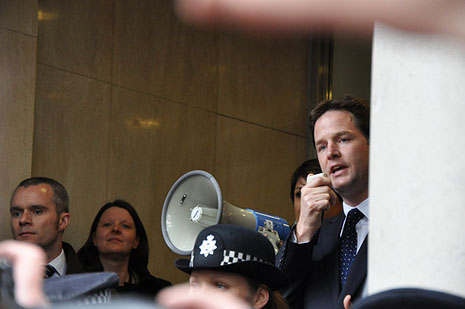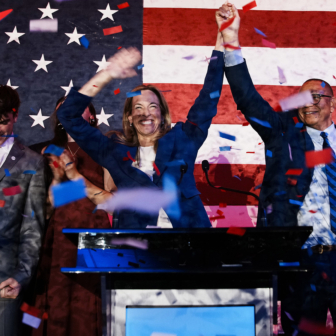Updated 11 May
EARLY in the British election TV coverage on Thursday evening there was a cross to the BBC’s glamorous election party. We heard “expert” analysis from Joan Collins, Piers Morgan, Ben Kingsley and Bruce Forsyth. I tried recalling whether Kerry O’Brien and Antony Green had ever crossed to Bert Newton and Kerri-Anne Kennerley. Probably not; nor would it have occurred to the editors of the Sydney Daily Telegraph, for all their sins, to publish – as a front-page story on the day before an election – voting advice from, say, Kochie or Kyle.
Unfortunately the Tele’s Murdoch stablemate here in London showed no such restraint. Simon Cowell, having assured us that he “always hated celebrities lecturing people on politics,” proceeded to endorse David Cameron as prime minister and complain about the ills of modern Britain in terms that might have been taken straight out of the Conservative Party manifesto. “Cowell insists he is NOT telling anyone how to vote,” said the Sun’s Tom Newton Dunn.
British voters – if perhaps only temporarily – have now reclaimed their political democracy from nonsense of this kind. Suddenly, we’re back in an older Britain, where the advice of constitutional experts and senior civil servants matters more than that of X-Factor judges and other assorted celebrities; where the conventions of parliamentary government carry greater weight than the right-wing press’s hysterical calls for the “squatter” – that’s Gordon Brown to you – to remove himself from Number 10; and where the monarchy matters not as a fertile source of stories for the tabloids and glossies but because the Queen has a central role in making the Westminster system work.
As everyone now knows, British electors have produced a hung parliament: the Conservatives have 306 seats, Labour 258, the Liberal Democrats 57 and the rest 28. There was nothing really surprising about this result. Most polls had been predicting it for months. They’d also been predicting its basic shape: the Conservatives with the biggest share of votes and seats, and Labour coming in second, followed by the Liberal Democrats. After the first of the televised debates there was a surge to the Liberal Democrats that indicated they might actually overtake Labour as the second-placed party. Their leader, Nick Clegg, even went so far as to suggest that the Liberal Democrats had replaced Labour as the main progressive party in British politics. But the support for Clegg and the Lib Dems didn’t hold.
There was always something heavily contrived about the reaction to the first debate. Sure, it wasn’t just a media beat-up, but Clegg’s performance on that occasion seemed to me less electrifying than the pundits quickly presented it. The debates attracted large television audiences and much public interest but the Clegg phenomenon was driven by the fact that a large number of voters – and no doubt many a journalist, too – wanted a shake-up and got it. Clegg exploited the opportunity provided by the formal equality of the first televised debate well enough to make the Liberal Democrats appear a respectable alternative to the major parties. But reaction to that first debate had much less to do with what actually happened that evening than with the existing mood of the electorate: a weariness of Brown and Labour, a wariness of Cameron and the Tories.
In the final weeks of the campaign, Clegg’s claims to clean-skin status wore increasingly thin. The right-wing media ran a characteristically nasty campaign to discredit him, but even without that he would have run into difficulties. The novelty was always going to wear off; and the twenty-four hour news cycle is a wonderful homogeniser. So the Liberal Democrats ultimately won just 23 per cent of the vote and five seats fewer than in 2005. Accustomed to the common wisdom that the Lib Dems would improve their position, I didn’t believe it when the exit poll released at 10 o’clock on election evening predicted a result along these lines. But it was accurate enough. For at least as long as Britain retains a first-past-the-post voting system, the Liberal Democrats’ third-party status seems secure.
Yet to talk of anything in British politics being “secure” at the moment is to misjudge the times. The major parties have made the Liberal Democrats their opening offers, the Tories conceding very little, Labour rather more. Clegg argued – with some justice, if not entirely in accord with the spirit of constitutional convention – that he should negotiate initially with Cameron as leader of the party with the largest number of seats and votes. But jumping either way carries enormous risks.
It’s surely one of the ironies of a very strange election that Labour sits in the most comfortable and satisfied position of the three parties. Facing electoral oblivion for much of 2008 and 2009, their vote and especially their seat tally have been resilient, especially outside the southeast of England. The media did its best to will disaster and thought it had found it when Brown forgot that he was still wearing a microphone and broadcast some embarrassing comments about a “bigoted woman” with whom he’d just conversed. Few said so at the time, but the most dangerous aspect of this moment was the possibility that Brown would call Gillian Duffy of Rochdale something worse, in an Anglo-Saxon vernacular quite inappropriate for a son of the manse. But he didn’t, and opinion polling suggested the effect of this incident on voters was practically nil. Labour even won Rochdale itself, with a slight swing from the Liberal Democrats.
“Bigotgate,” as the media predictably called the affair, is the parable of the election, but not in the way that the journalists imagined it would be. It didn’t destroy the Labour campaign; it wasn’t even a decisive moment. Instead, it signalled the refusal of the voters to be marshalled quite in the manner their masters in the media commanded. Followed, as Brown’s gaffe was, by a strong performance from David Cameron in the final debate, it seemed a critical moment at the time. Would the Tories get over the line and form a majority government? There was an indescribable feeling in many a gut that something had happened over that forty-eight hours that had shifted the dynamics of the whole election. Cameron had removed all doubt and finally looked like the prime minister he was destined to become.
There was in reality nothing outside the imaginations of the commentariat to suggest such a trend. Cameron never managed to convey a clear message about what the Conservatives stood for. His “Big Society” vision made such a miserable impact that even he seemed to forget about it as the campaign wore on. It was, in any case, a transparent effort to paint Labour as the party of big and impersonal government while also distancing the modern Tories from the notorious Thatcherite claim that “there is no such thing as society.” Voters seemed about as excited by this neo-Blairite bid for the middle way as they were by Brown’s equally muffled messages.
On one reading of the results, voters have delivered the Tories a rebuff, despite a very large gain in seats, mainly from Labour. Even with potential Unionist allies in Northern Ireland they cannot govern, whereas if Labour managed an agreement with the left-of-centre Liberal Democrats, as well as the nationalist parties in Scotland and Wales, some Ulster members (such as the three Social Democrats and the successful non-sectarian Alliance Party candidate), and the new Green member for Brighton Pavilion, they could form an unwieldy but potentially workable majority – and arguably a more natural one than that being contemplated by the Tories. The occasional commentator is spinning the poll on 6 May as a vote for a centre-left government, not a Tory one.
IN THE END, someone has to form a government, even if – as seems possible – it lasts no more than a few months. The idea of a coalition between the Conservatives and the Liberal Democrats seems, on the face of it, rather odd, even allowing for strange times bringing together strange bedfellows. Only the creative could find very much in common between them. The most anti-European of the three parties is treating with the most pro-European. The Conservatives support the renewal of Trident; the Liberal Democrats oppose it. The Liberal Democrats favour an amnesty for some categories of illegal migrant; the Tories take a hard line.
But electoral reform is the rock on which efforts to make an arrangement between these parties is most likely to founder. The Liberal Democrats – rightly outraged that their almost quarter-share of the vote translates into a one-tenth share of Commons seats – want proportional representation; but it’s not even clear that the Tories are prepared to offer an Australian-style preferential system. At the moment, they’re offering an all-party inquiry into reform of the electoral system, a proposal that looks like a blatant ambush. The Liberal Democrats would have in mind the possibility of Cameron merely waiting for a pleasant turn in the opinion polls, calling a snap election, winning a clear majority, and then maintaining a first-past-the-post system with which the Tories seem perfectly comfortable.
The party leaders do not have anything like a free hand. Cameron knows that his own right is both critical of his electoral campaign and hostile to voting reform. They have no sympathy with the Liberal Democrats. Clegg knows that there are any number of scenarios in which his treating with the major parties will lead his party into the oblivion that they suffered last time Britain faced a hung parliament, in 1974. And the Liberals Democrats have party rules that prevent him from entering into alliances without wide consultation, with even a membership ballot being a possible requirement.
Meanwhile, Gordon Brown – holed up in Scotland over the weekend, so hardly the squatter in Number 10 – was watching and waiting. He offered the Liberal Democrats a referendum on proportional representation, but Clegg would have recognised that tying the Liberal Democrats to a Brown leadership was suicidal. Lord Mandelson, a senior Labour figure, obliquely hinted at the possibility of replacing him in order to facilitate a coalition with the Liberal Democrats; that option was clearly on many a Labour mind – including Gordon Brown’s, and the prime minister announced yesterday that he would resign the leadership. But the presidentialisation of the campaign through the leaders’ debates presents problems with such a manoeuvre in terms of democratic legitimacy.
The final outcome of the negotiations between the parties still unclear, but the underlying reality that will confront any new government will be much the same whatever the result of the present frenzied backroom manoeuvring: Britain is about to head into an era of the most severe government austerity.
All the same, it may well do so with its political system in a rather better state of repair than seemed possible a year ago. Voter turnout was up a little, at 65 per cent, compared with 61.4 per cent at the last election; but it was much lower than the figures for the 1980s and 1990s, a point that calls into question the supposedly energising impact of the leaders’ debates and tight pre-election polling. There were aspects of the day itself that were a complete fiasco, such as voters’ standing in long late-night queues and being locked out because of inadequate staffing of the booths. It was nevertheless touching listening to the complaints of one woman locked out of the polling booth at 10pm. She seemed to believe that her vote might count, that democracy guaranteed her a say in the future of her country at the ballot box, and that she had been deprived of it through the incompetence of others. Such ideas suggest that a faith in the system, if not in those who step forward to run it, has survived the cynicism induced by spin, the Iraq War, the expenses scandal and much else that has tried the patience of a resilient people.
They’ll need such resilience. Because, given their verdict of 6 May, they’ll almost certainly be called on to endure another election campaign sooner rather than later. •




